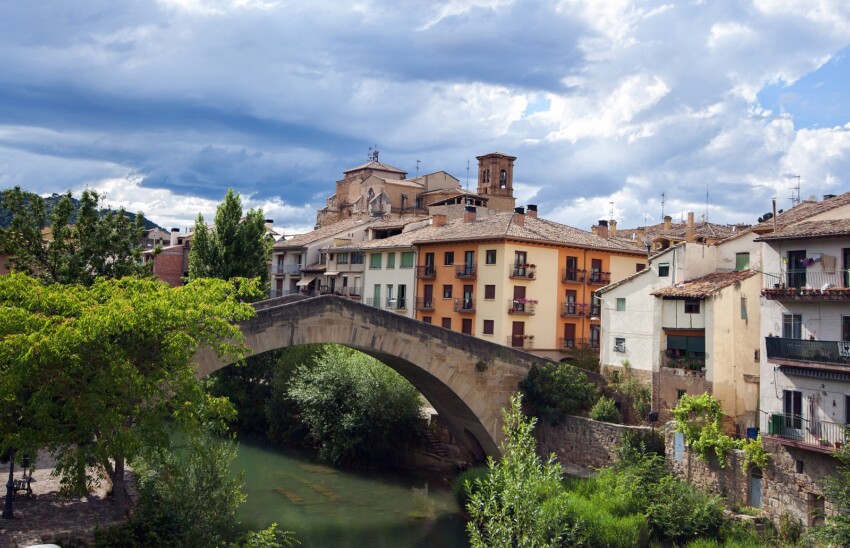

Crossed by the river Ega, with the historic centre spanning both banks and divided by an iconic stone bridge, Estella (or Lizarra in Basque) is the most artistically interesting town along the classic route of the Camino de Santiago and one of those worth stopping at.
Pilgrims and walkers on the Pilgrim’s Way generally arrive in Estella in the late afternoon, at the end of the Puenta de la Reina-Estella stage, and leave early in the morning for Los Arcos without having time to visit Estella at leisure. Too bad: this ancient medieval town is full of beautiful Romanesque and Gothic buildings and a couple of interesting examples of Renaissance architecture.
It takes at least one day to admire the architectural and artistic beauty of Estella and to enjoy the special atmosphere of this town. But not only art and sacredness: Estella is also a lively town full of services, shops and opportunities for wonderful walks in the surrounding area off the route of the Camino de Santiago and other more adventurous outdoor activities.
Set on a plain surrounded by rolling hills that protect it from the winds, Estella is a charming, hospitable and gourmet town with many restaurants and tapas bars serving tasty local specialities. It is a must-see on a travel itinerary in Northern Spain, on foot or by car.
With so many things to see in Estella, it is really unthinkable to pack everything into a few hours, unless you limit yourself to a superficial exploration of the old town. Here are the attractions not to be missed.
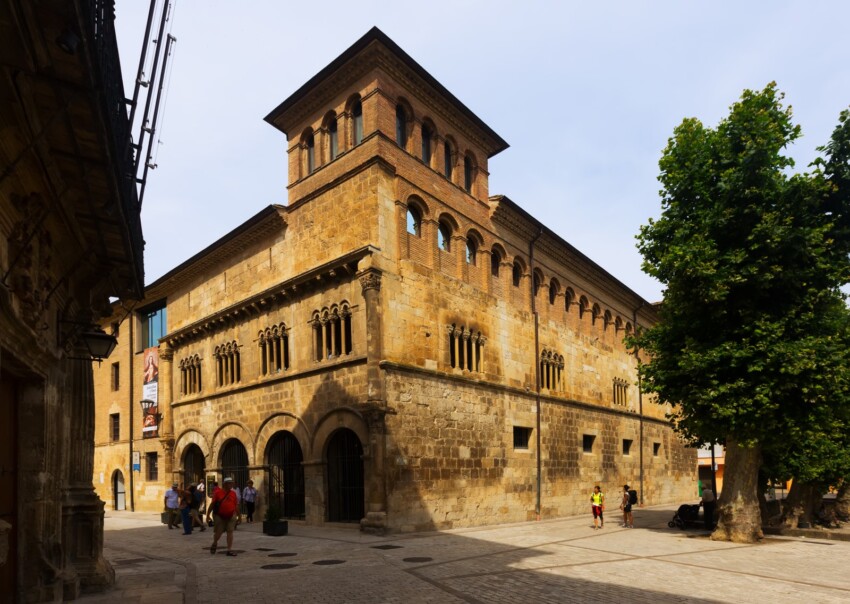
Estella’s top attraction is the grandiose Palace of the Dukes of Granada de Ega also known as the Palace of the Kings of Navarre, located in the characteristic square of San Martín.
It is an impressive sight, even more so in the evening when the lighting enhances the shapes of the palace, creating suggestive chiaroscuro effects. Built in the 12th century, it is one of the few examples of Romanesque-style civil architecture in Spain and was declared a national monument in 1931.
Take some time to admire the harmonious façade of this palace, arranged on three levels and embellished with arches, windows, towers and capitals decorated with floral and animal motifs. One capital is decorated with scenes of the struggle of the paladin Roland against the Moorish giant Ferragut. Another tells the fable of the donkey playing the harp heard by a lion; next to them are two misers and a group of condemned men guarded by devils.
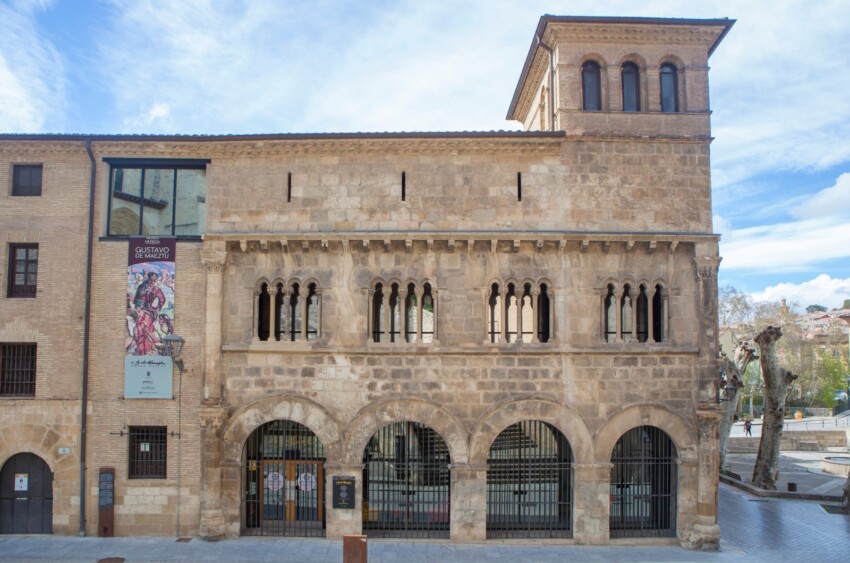
The Palace of the Dukes of Navarre is home to the Gustavo de Maeztu Museum, dedicated to the life and works of an important Spanish painter who lived at the turn of the 19th and 20th centuries, who after numerous journeys settled in Estella and remained there until his death.
On display are paintings depicting female figures, scenes from the Spanish Civil War, landscapes, still lifes; the collection also includes sketches, drawings and self-portraits.
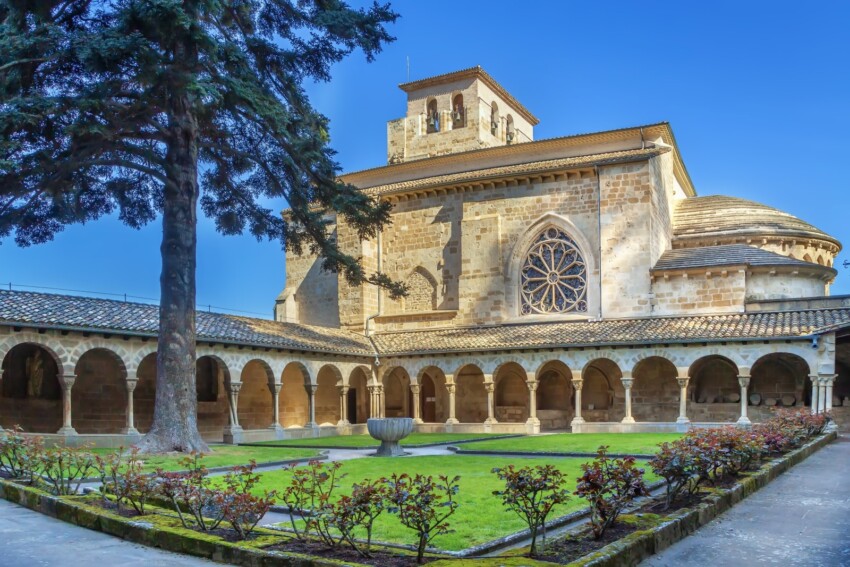
The heritage of religious architecture in Estella is truly impressive: magnificent churches of different periods and styles are concentrated in this small town.
The most beautiful religious building in Estella is probably the Church of San Pedro de la Rua, the oldest in the town. It is a Romanesque-style church built in the 11th century, with three Gothic naves, a Baroque chapel and a Rococo altar. The cloister is a perfect place to stroll in silence, savouring the magic of these centuries-old places.
Much more modern but no less interesting is the Basilica of Our Lady of the Puy, a neo-Gothic church built on the site where, according to legend, an image of the Virgin Mary was found. Originally an altar was built, then a Baroque church and finally the present star-shaped basilica, chosen to recreate the light effect formed when the image was discovered.
Other churches not to be missed in Estella are the Church of San Miguel, a late Romanesque church that magnificently combines Romanesque and Gothic elements, and the Church of Santo Sepolcro, a one-nave church with a magnificent Gothic façade.
Also worth a visit is the Church of Santa Maria Jus del Castillo, now home to the tourist office.
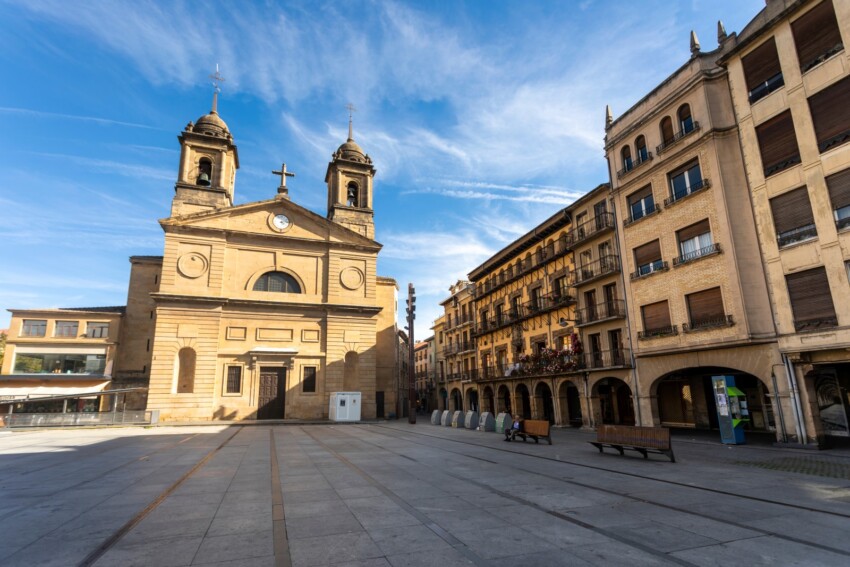
Plaza de los Fueros is the heart of city life. A very special market is held in this square and the surrounding streets, where shopkeepers are dressed in period clothing. Before you get distracted by the temptations of shopping, take a look at the magnificent neoclassical façade of the Church of San Juan.
If you haven’t made it to Estella on foot and feel like stretching your legs or if you still have energy left for a few more steps, you can take a relaxing stroll along the river by following the Paseo de los Llanos, a green route that will take you to the Convent of Santa Clara. If, on the other hand, you need a rejuvenating bath, seek out the Agua Salada pool, a natural pool along the banks of the river that is said to have healing properties.
The hotel offer in Estella is very good, both in terms of quantity and quality of accommodation, but due to the particular type of tourism in the town, mid to low-end establishments prevail. Low-cost travellers can choose from numerous hostels, b&b’s and no-frills pensions opened to meet the great demand for cheap rooms by pilgrims and walkers on the Pilgrim’s Way to Santiago.
Those who want some extra comfort will find a couple of nice 3-star hotels and modern flats. There is no shortage of luxury options for a romantic holiday or for those who want more charm: you can choose between a 4-star hotel and beautiful rural houses surrounded by greenery, a short distance from the historic centre.
Estella is located in the region of Navarre, halfway between the cities of Pamplona and Logroño (the latter in the region of La Rioja). Bilbao is less than 100 km away, while the distance to Madrid is more than 300 km.
The most common way to get to Estella is on foot, following the 23 km route that starts in Puente de la Reina and is a section of the French Way (the classic route of the Camino de Santiago).
For those who do not have the desire or the time to walk, there is the possibility of reaching Estella by bus from Pamplona: the journey time is about an hour, and runs daily and fairly frequently.
If you travel by car, you will have no difficulty reaching Estella because the city is located along the main A-12 road that connects Pamplona with Logroño.
What's the weather at Estella? Below are the temperatures and the weather forecast at Estella for the next few days.